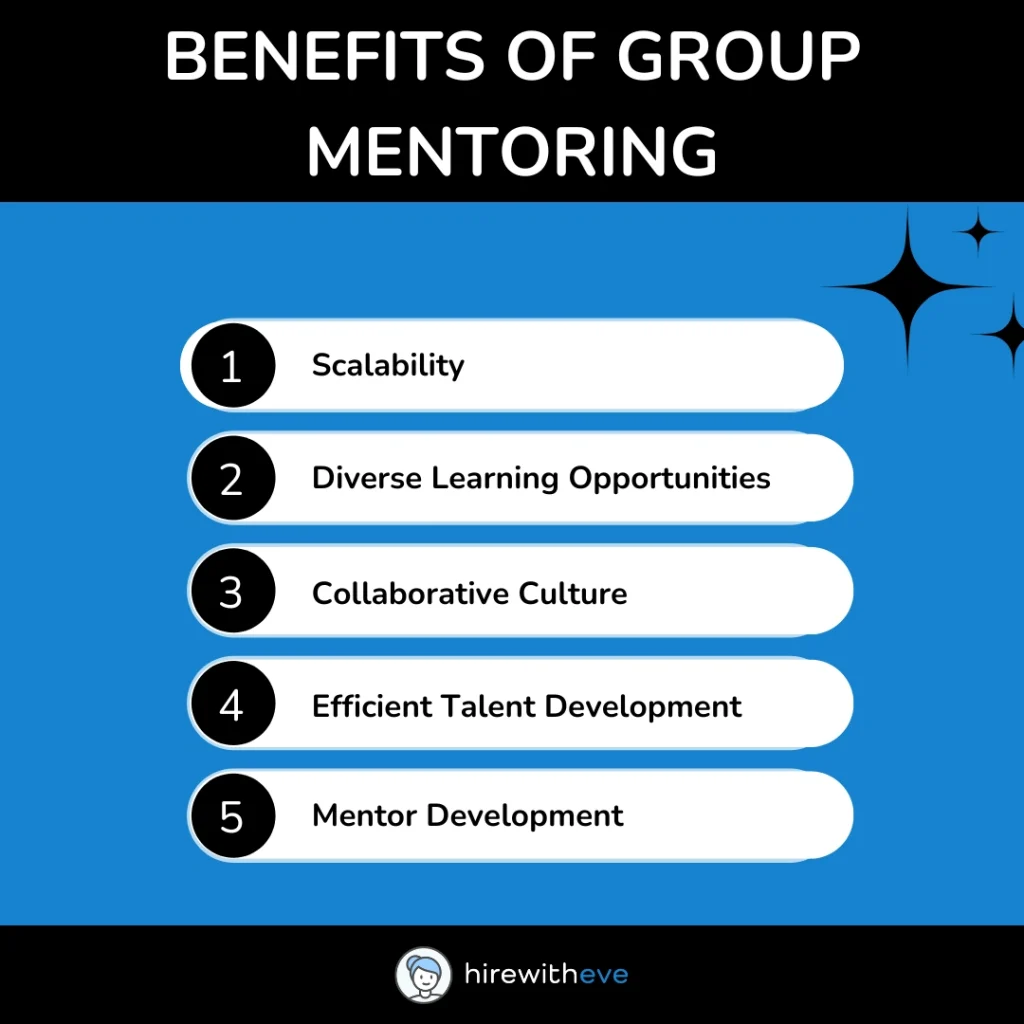What is Group Mentoring? Everything You Need to Know

In today’s fast-paced work environment, developing talent through structured mentoring is more critical than ever. While traditional one-on-one mentoring has its merits, organizations are increasingly turning to Group Mentoring as a powerful alternative. Group Mentoring allows multiple mentees to learn from one or more mentors in a collaborative and inclusive setting.
This article will dive into Group Mentoring, outlining what it is, how it benefits talent acquisition efforts, and why HR managers should consider adopting it within their organizations.
What is Group Mentoring?
Group Mentoring is a mentoring format where a mentor works with several mentees simultaneously, offering guidance, knowledge-sharing, and support in a group setting. Unlike traditional mentoring, which focuses on one-on-one interactions, Group Mentoring leverages the collective wisdom of the mentor and the shared experiences of all participants. This method fosters an environment of collective learning and engagement, making it an ideal approach for companies that want to cultivate a collaborative work culture.
Through Group Mentoring, participants can benefit from diverse perspectives, engage in active discussions, and apply the shared learning in their professional growth. It’s particularly effective for leadership development, onboarding, and specialized skill-building initiatives within an organization.
Benefits of Group Mentoring for Talent Acquisition
For HR managers and talent acquisition specialists, implementing Group Mentoring programs can provide significant benefits.
Below are the key advantages:

Scalability: One of the primary benefits of Group Mentoring is its scalability. Instead of needing several individual mentoring sessions, a single mentor can address multiple mentees simultaneously. This makes it easier for organizations to provide mentorship opportunities without overburdening senior employees.
Diverse Learning Opportunities: Group Mentoring allows mentees to learn not only from the mentor but also from each other. Participants can bring their unique experiences to the table, enriching the learning environment and offering different perspectives that mentees might not have encountered in one-on-one mentoring.
Collaborative Culture: Group discussions foster a culture of collaboration. As employees learn together, they build stronger relationships, which can lead to better teamwork across departments. This type of environment is highly beneficial for companies looking to improve cross-functional collaboration.
Efficient Talent Development: For organizations facing rapid growth or high turnover, Group Mentoring is a highly effective tool for developing talent quickly. Rather than focusing on individual mentorship sessions, HR managers can implement Group Mentoring programs that allow new hires to gain insights and experience more quickly.
Mentor Development: Mentors in Group Mentoring sessions also have the opportunity to enhance their leadership and teaching skills. Mentoring a group requires the ability to manage multiple mentees’ needs, promote group discussions, and foster inclusive learning, all of which contribute to their professional development.
How Group Mentoring Works in a Corporate Setting?
In a corporate setting, Group Mentoring can be structured in various ways, depending on the objectives and needs of the company.
Here are some common formats:
Cohort-Based Mentoring: In this structure, employees are grouped based on similar roles or career development goals. A mentor, typically an experienced leader or senior executive, leads regular sessions that focus on specific areas of growth, such as leadership, project management, or team collaboration.
Cross-Functional Group Mentoring: Organizations may also implement cross-functional Group Mentoring, where employees from different departments participate in a mentoring group. This not only broadens participants’ knowledge of the organization but also helps break down silos between departments.
Peer-Led Group Mentoring: In some instances, employees of similar experience levels form a peer-led Group Mentoring group where they guide each other through challenges and opportunities. This format fosters camaraderie and helps participants develop leadership qualities while being both mentors and mentees.
In all formats, the mentor must establish clear objectives, facilitate discussions, and provide actionable insights. The effectiveness of Group Mentoring depends on the active engagement of both the mentor and mentees.
Key Differences Between Group Mentoring and Traditional Mentoring
While both traditional one-on-one mentoring and Group Mentoring aim to develop employees, there are some key differences:
Number of Participants: Traditional mentoring involves one mentor and one mentee, while Group Mentoring includes multiple mentees per mentor.
Diverse Insights: Group Mentoring benefits from a wider range of perspectives, with participants learning from each other’s experiences. In contrast, traditional mentoring focuses on the personal relationship between mentor and mentee.
Efficiency: Group Mentoring is more scalable and time-efficient, as mentors can address the needs of several mentees at once, while traditional mentoring demands individualized attention.
Group Dynamics: In Group Mentoring, group dynamics play a significant role. Mentees learn not only from the mentor but also from interacting with peers, fostering a collaborative and open environment. Traditional mentoring, on the other hand, is more private and individualized.
Group Mentoring: Survey Insights and Trends
According to a survey conducted by the Association for Talent Development (ATD), over 71% of organizations report using some form of mentoring in their employee development programs, with Group Mentoring growing in popularity. Companies that adopt Group Mentoring report increased employee engagement, faster onboarding, and improved leadership development.
Moreover, the survey revealed that employees who participated in Group Mentoring felt more connected to their organization and were more likely to stay with the company long-term. These findings underscore the importance of Group Mentoring as a strategic tool for talent acquisition and retention.
Conclusion
Group Mentoring offers a powerful and scalable approach to employee development, benefiting both organizations and their employees. By leveraging the diverse experiences of mentees and mentors, Group Mentoring fosters a collaborative learning environment that enhances team dynamics, improves leadership skills, and accelerates career development.
For HR managers and talent acquisition specialists, adopting Group Mentoring can be a game-changer. It allows organizations to nurture talent efficiently, cultivate a collaborative culture, and boost employee engagement and retention.
In an evolving work environment where employee development is key to organizational success, Group Mentoring is a strategy that should not be overlooked. By implementing effective Group Mentoring programs, companies can enhance their talent pipelines and ensure long-term success in today’s competitive market.

2 thoughts on “What is Group Mentoring? Everything You Need to Know”